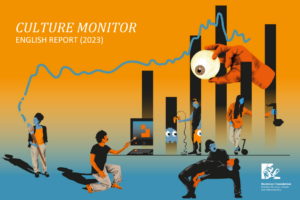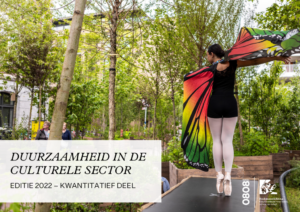The arts and culture sector displays a growing interest in co-ops. Kate Oakley, who works as a researcher at the University of Glasgow, observes that besides facilitating collective work and production, co-ops also reflect a fundamental political and ethical preference.
From my office at the University of Glasgow, it’s about 50 kilometres up the Clyde Valley to New Lanark, a UNESCO World Heritage site that commemorates Robert Owen – one of the founders of the co-operative movement in the United Kingdom. Owen was a textile manufacturer turned reformer and in the early 19th century, he set up New Lanark not as a co-operative, but as a paternalistic model factory with housing, childcare and education for its workers. In later life, Owen saw the limits of paternalism as he moved towards socialism and his ideas for co-operatives owe much to his involvement in US-based utopian socialist communities. As the UNESCO World Heritage listing puts it, New Lanark is ‘a unique reminder that the creation of wealth does not automatically imply the degradation of its producers’. The degradation of work still surrounds us today and takes a variety of forms from gross exploitation to self-exploitation and overwork. New Lanark, however, reminds us that the history of worker self-organisation is both extensive and inseparable from the politics of labour.
Attraction
My field of expertise embraces the cultural industries, and I have been researching cultural work for some time, as well as teaching those who wish to enter these sectors. The appeal of cultural work is not hard to understand – it promises self-expression, a level of autonomy, collaboration with others who share similar interests and for a very, very small number – success and even wealth. As such, the cultural industries are often over-supplied with labour and, together with other factors such as the concentration of media ownership and the development of global supply chains, has led to a situation where exploitation and inequality are rife. Employment favours white middle-class male graduates over other groups, and regional distribution is uneven and focused on the urban. Additionally, many sectors including film, television videogames and so on have been at the centre of campaigns like #metoo and #oscarssowhite, but also of accusations of a working culture characterised by long hours, exploitative practices and bullying.
Growing policy and worker awareness of these issues has produced a wave of worker and student organisations addressing issues such as unpaid work (commonly in the form of traineeships), low pay and living in a state of uncertainty. Together with colleagues at the Cultural Workers Organize project, I have been examining different ways in which cultural workers organise collective responses to problems related to cultural labour. As scholar Marisol Sandoval noted, in discussions of cultural work, we currently seem to be caught between the idea that work is everything – that we must be ‘passionate’ about it and ‘do what we love’, or that work is nothing but hell, alienating and exploitative. But people’s desire – both young and old – to be involved in cultural endeavours is not going to disappear, and finding ways to support pleasure, solidarity and fulfilment in cultural work therefore remain crucial.
Political preference
This includes the formation of co-operatives and while these are common across the economy, particularly in food production and retail, they are, as this issue of Boekman shows, also of increasing significance in the cultural sectors. I have been researching the potential for cultural co-ops for some time and have, in recent years conducted interviews across the UK with co-ops in the arts and cultural sectors. Policymakers and arts funders – aware of the problems of cultural labour markets – are increasingly interested in co-ops, but they often equate them with social enterprises or charities as just another non-profit business model. While my research thus focused on co-ops as places of work and production, broader questions of politics kept emerging. As a result, I have come to see co-ops as a fundamentally political orientation, a way to connect broader questions about democratisation, about power and about place. The economy is a political arena, the workplace somewhere we are often confronted by questions of inequality or exploitation, and the act of working involves constant political choices. For those in the arts and cultural sectors – often highly-educated and politically aware – this lies at the heart of their rationale for co-op formation. The remainder of this article draws from these interviews to briefly explore this issue and what it tells us about the potential for cultural co-ops.
Co-operatives are of increasing significance in the cultural sectors
The organisations interviewed ranged across the cultural sectors from design co-ops, to publishing and performing arts. In almost all cases, the decision to form a co-op was motivated by politics or ethics; the ‘advantage’ of being a co-op rarely registered. The main reason for establishing a co-operative was not a different kind of organisational structure, but a commitment to a particular set of values or ethos. Notions of autonomy were strongly present, as they often are for those who work in culture, but in this case it was not purely in the individual sense, but as an aspiration that could also be fulfilled collectively. This is exactly the type of control many creatives say they want, but are told is only available to them as ‘entrepreneurs’.
‘T here are some fixed co-op values and principles… in general, overall, the values seem to be that you’re going to be fair, how you charge, how you treat people with more respect, you’re going to be more ethical in the ways you work, you listen to people. It’s quite rare to hear of someone being completely done over by a co-op.’
‘T here is no hierarchy because we’re a co-operative, so we all have a vote about everything, we’re all of equal standing.’
Concerns about the broader cultural sectors and their work practices also served as a motivation.
‘We set up as a co-operative because we believe in the co-operative idea and the co-operative economy. We think that media organisations could be better if they were run as co-operatives.’
‘It was more a conscious decision …. that the intentions were good. If we started a limited company, I could see how that would send a message that actually these guys are just after generating a whole load of money, which is not what we’re about.’
‘Publishing is changing. It’s much more marketing than once upon a time, authors are finding advances being cut. So, in terms of the remuneration going to authors, it’s an increasingly small share of the pot. And we were discussing whether there are other ways that authors can try and have more control over their work and actually have more benefit from the income. So, that’s the idea behind it.’
Getting away from hierarchy and the importance of ‘having a voice’ at work was frequently mentioned, summarised by one co-op member who said, ‘I can’t imagine being in a situation at work where I could not voice my opinion and say no, that’s wrong.’
‘ I think the positive for me is the diversity and having different voices at the table. I like the flat structure as well. I think there is a lot to be said for that ability, the way we’ve structured it, to be able to assist and help each other out. I also like the democratic feel of decisions being made together.’
‘There’s also the lack of management hierarchy politics. With a hierarchy you don’t always get listened to…’
Throughout the interviews, there was a sense that many of those involved in co-ops wanted to push things further. People were interested in what they could learn from social movements in terms of flat organisational structures and collective decision-making methods such as sociocracy. One local government policymaker I spoke to linked this explicitly to the sense of crises – political, social, environmental – which, he argued, was starting to change how people view capitalism overall. ‘There are cracks in the physical and social fabric, people are starting to say, wait a minute, what’s going on here?’ Or as another of the interviewees said: ‘Nobody’s coming to save us. We need to step up and do something.’
Enthusiasm
I hope this short piece provides a sense of what motivates co-op founders and workers in the cultural sector. Many of my interviewees complained about the difficulties they encountered when setting up co-ops in the UK, where business advisors are often unfamiliar with the form, and banks and other financial institutions are less willing to lend. While the majority of those who enter the cultural sectors are graduates, most higher education in these fields still tends to assume that students will become employees of public-sector cultural organisations, self-employed ‘freelancers’ or entrepreneurs trying to set up their own growthoriented cultural businesses. In England, the dismantling of stand-alone arts schools has narrowed the entrance to cultural education, and high fees have produced an indebted graduate population facing fewer options. While high-quality arts education is still on offer, contradictions abound. As one interviewee told us, when she was studying fine art, education encouraged co-operation and collaboration: ‘But once we got to the degree show at the end of it – it was all about business and competition.’
It is important to stress that co-ops are not a panacea for all that ails cultural labour. Research suggests that co-op members and workers are drawn from the same, unrepresentative, labour pool as other forms of cultural organisation, with women, working class people and those from the global majority all under-represented. The high level of commitment that co-ops can require, and the relative slow pace associated with collective decision-making means that the demands of the cultural workplace – including very long hours and poor work life balance – can also be part of the co-op experience. Supporters would however argue that co-ops at least enable workers to challenge and raise these issues in a nonhierarchical context.
My interviews with co-ops generally reflect an enthusiasm bordering on the evangelical for the benefits of co-operative work. With others, I am currently working on an undergraduate course on co-operative work and generally find that students – preoccupied as they are with concerns and anxieties about the working world they will inherit – relish the idea of having a bigger say in their working lives, even at the cost of speedy decision-making or income growth.
Co-ops are an old organisational form and today’s changes differ from those that affected the Lanarkshire weavers in the 19th century. But, as one of my interviewees commented: ‘I think the co-op sector will continue to get more exposure now with everything from climate change to ethical trading and everyone being more interested in a better way of working and realising certain ways of working aren’t sustainable … So, it’s starting to click a little bit…. It’s quite positive.’
Literature
- Boyle, D. and K. Oakley (2018) Co-Ops in the cultural industries. Manchester: Co-operatives UK.
- De Peuter G., G. de Verteuil and S. Machaka (2022) Co-operatives, work, and the digital economy: a knowledge synthesis report. Manchester: Co-operatives UK.
- Oakley, K. (et al.) (2017) ‘Cultural capital: arts graduates, spatial inequality, and London’s impact on cultural labor markets’. In: American Behavioral Scientist, year 61, issue 12, 1510-1531.
- Sandoval, M. (2018) ‘From passionate labour to compassionate work: cultural co-ops, do what you love and social change’. In: European Journal of Cultural Studies, year 21, issue 2, 113-129.
Notes
- whc.unesco.org/en/list/429/
- culturalworkersorganize.org/
- All interviews were conducted in 2022 as part of research project funded by the Universities of Glasgow and Radboud.
About the author
 Kate Oakley is Professor of Cultural Policy at the University of Glasgow where she works on issues of cultural labour.
Kate Oakley is Professor of Cultural Policy at the University of Glasgow where she works on issues of cultural labour.
Mill One Factory and water houses, New Lanark. Photography: Historic Environment Scotland, © Crown Copyright HES

Author: Kate Oakley
Notes
Mill One Factory and water houses, New Lanark. Photography: Historic Environment Scotland, © Crown Copyright HES


